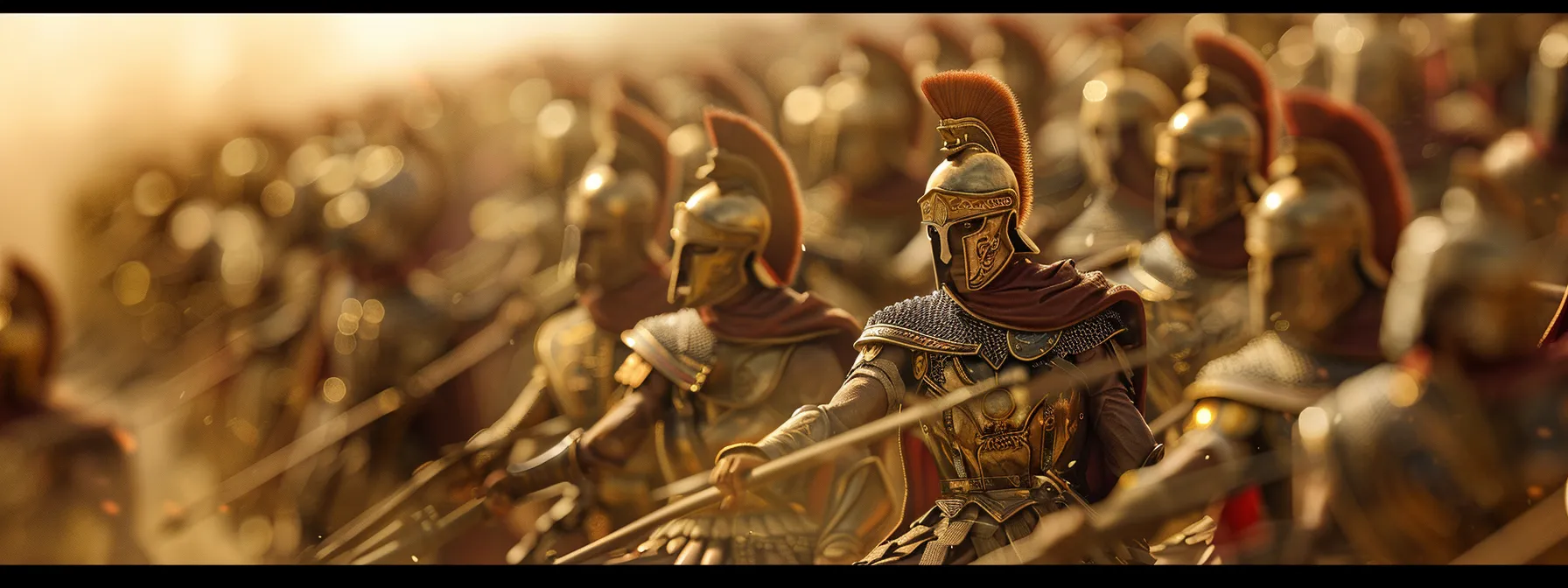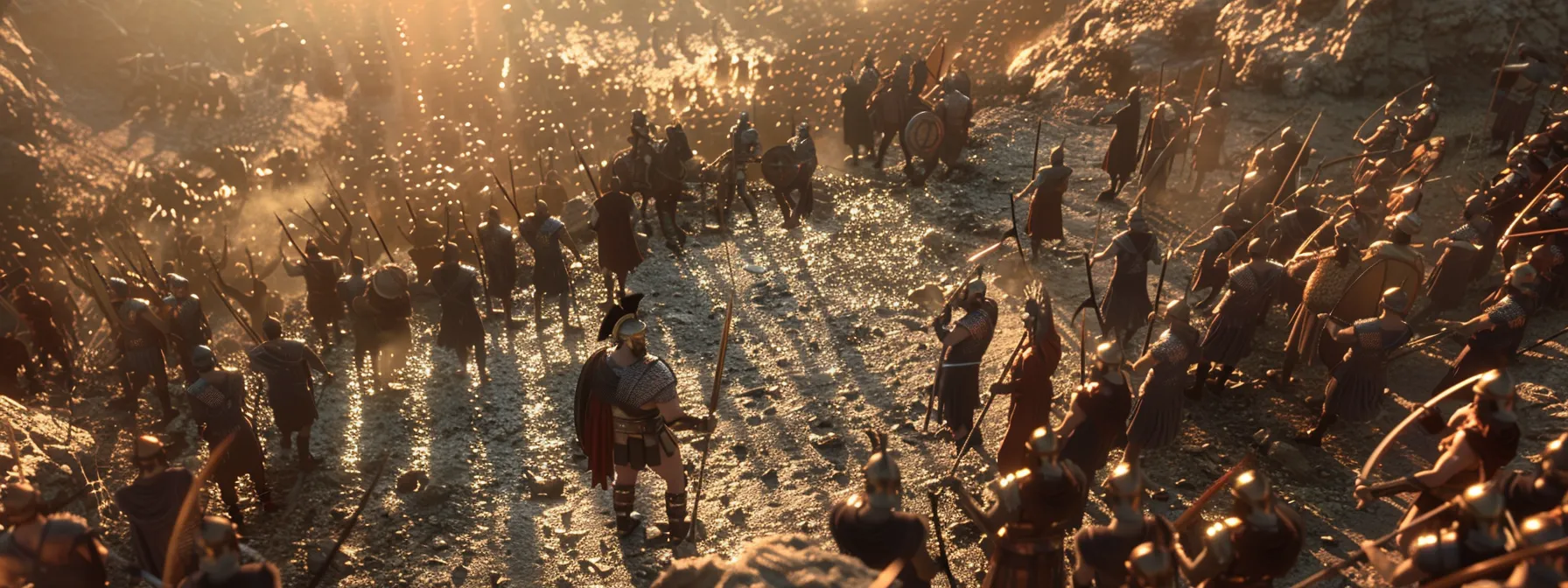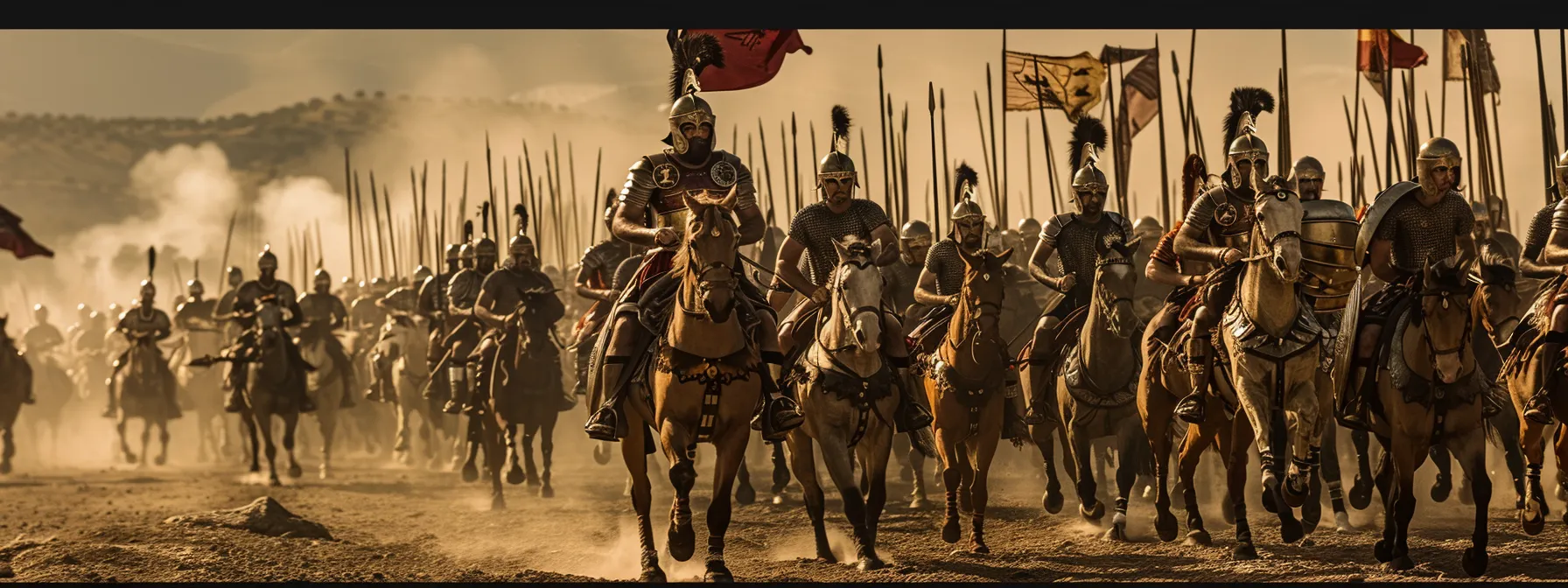Disclaimer: We sometimes use affiliate links in our content. For more information, visit our Disclaimer Page.
Alexander the Great is often considered one of history’s most brilliant military strategists. Through innovative tactics, like those demonstrated at the Battle of Issus, he expanded his empire by leveraging his superior cavalry and revolutionary military campaign techniques. This blog post will explore the early influences that shaped Alexander’s strategic genius and examine his leadership qualities that inspired unwavering loyalty. Readers will gain insights into how these lessons can be applied today, addressing the challenge of developing effective strategies in their own pursuits. Understanding Alexander’s approach can enhance modern leadership and strategic thinking skills.
Key Takeaways
- Aristotle’s teachings significantly shaped Alexander the Great’s military strategies and leadership style
- King Philip II’s military reforms provided a strong foundation for Alexander’s tactical innovations
- Alexander effectively adapted his strategies to diverse terrains and cultural contexts during his campaigns
- Promoting Hellenization fostered unity and loyalty across the territories he conquered
- Alexander’s emphasis on communication and vision inspired lasting loyalty among his troops
Early Influences That Shaped Alexander’s Strategic Genius

Alexander the Great’s strategic genius was significantly influenced by several key factors in his early life. Aristotle’s teachings instilled in him a profound understanding of strategy, while King Philip II’s military reforms provided practical insights into effective warfare, including the use of chariots and companion cavalry. Additionally, exposure to Greek philosophy and early childhood experiences fostered loyalty and leadership skills, all of which shaped the strategies of Alexander the Great as he set out to conquer the Middle East.
The Impact of Aristotle’s Teachings on Strategy
Aristotle’s teachings profoundly influenced Alexander the Great’s approach to military strategy, particularly in understanding the relationship between politics and warfare. By studying the nature of governance and power dynamics, Alexander learned to view battles not merely as military engagements but also as political maneuvers. This comprehensive perspective allowed him to effectively lead his infantry and employ tactics that maximized his forces’ strengths while exploiting his enemies’ weaknesses, ensuring his victories across Macedonia and beyond.
Furthermore, Aristotle instilled in Alexander the importance of disciplined formations, like the phalanx, which utilized long shields and spears to create an impenetrable barrier. This strategic innovation, rooted in the principles taught by his mentor, contributed significantly to the effectiveness of Philip II of Macedon’s military reforms. Armed with this knowledge, Alexander not only excelled in commanding troops but also adeptly navigated the complexities of battlefield leadership, reinforcing his reputation as one of history’s greatest military strategists.
Learning From King Philip II’s Military Reforms
King Philip II’s military reforms laid the groundwork for the ancient Macedonian army’s unprecedented success on the battlefield. He reorganized the army, introducing the use of the phalanx formation, which combined heavy infantry armed with long spears and shields. This strategic shift allowed his forces to engage effectively with the Greeks, enabling them to dominate in numerous battles and establish a formidable reputation throughout the region.
Moreover, King Philip II enhanced the training and discipline of his troops, integrating advanced tactics that emphasized mobility and quick maneuvers. This transformation not only strengthened the army but also equipped Alexander the Great with the expertise needed to lead effectively. As a result, Alexander was able to build upon these reforms, applying innovative strategies that would further solidify his legacy as a conqueror and refine the military techniques that reshaped the ancient world.
Exposure to Greek Philosophy and Warfare
Exposure to Greek philosophy significantly shaped Alexander the Great’s understanding of military strategy and warfare. Philosophers discussed the importance of reason and planning in both governance and battle, which informed Alexander’s tactical decisions. For instance, lessons from the battle of Chaeronea, where Alexander demonstrated his strategic foresight, laid the groundwork for his later successes, including the battle of the Granicus, as he expanded his empire into Asia Minor.
Geography also played a crucial role in Alexander’s military strategies, as his philosophical education equipped him to analyze terrain and adapt his tactics accordingly. His ability to leverage geographical advantages allowed him to outmaneuver larger enemy forces, ultimately contributing to his conquests. This strategic mindset enabled Alexander to not only lead his troops effectively but also establish and expand a vast empire that transformed the ancient world.
Childhood Experiences That Fostered Leadership
Alexander the Great’s childhood experiences played a crucial role in developing his leadership abilities. Growing up in the royal court of Macedon, he was exposed to the complexities of politics and governance, which laid the foundation for his later military strategies. This early exposure enabled him to understand the interplay between ancient Greek warfare tactics, such as the phalanx formation, and the political dynamics that often influenced battles, a perspective that aligned with scholarly discussions found in resources like the Oxford University Press.
Additionally, Alexander’s interactions with influential figures, including his later tutor Aristotle, fostered a sense of ambition and responsibility. His upbringing instilled in him the importance of effective leadership, as he learned to navigate challenges and inspire loyalty among his peers. This early development ultimately prepared him for his future conquests, including his campaigns in regions like Iraq, where his strategic mindset proved essential to his success in expanding his empire.
Alexander learned from the past and listened to wise minds. His journey led him to bold innovations that would change the battlefield forever.
Revolutionary Military Innovations

Alexander the Great’s military innovations played a vital role in his ability to conquer vast territories. He refined the Macedonian phalanx formation, enhancing infantry capabilities. Additionally, he integrated cavalry and infantry tactics to maximize battlefield effectiveness. His advancements in siege warfare techniques and adaptability to diverse terrains and enemies, such as at the Battle of Gaugamela against Porus, showcased his strategic policy and contributed to his legendary status.
Refinement of the Macedonian Phalanx Formation
The refinement of the Macedonian phalanx formation was a critical innovation that contributed to Alexander the Great’s military successes. This tightly organized infantry formation employed long spears, known as sarissas, which served as effective weapons against enemy forces. By mastering this formation, Alexander’s army was able to maintain discipline and cohesion in battles, becoming a formidable force against opponents from ancient Greece to Bactria.
Historians note that the adaptability of the phalanx under Alexander’s command showcased its versatility in various combat scenarios. As he engaged in campaigns across different terrains and against diverse armies, the phalanx demonstrated its effectiveness while also integrating tactics that considered the local practices and religions of conquered peoples. This strategic approach not only amplified the impact of Alexander’s military innovations but also solidified his reputation as a genius tactician in the annals of history.
Integration of Cavalry and Infantry Tactics
The integration of cavalry and infantry tactics marked a significant evolution in military operations under Alexander the Great’s leadership. By effectively combining swift cavalry units with disciplined infantry formations, Alexander created a dynamic fighting force that could adapt to various battlefield conditions. This strategy not only maximized the strengths of each group but also made it challenging for his enemies to counter such a cohesive force, a tactic that has been studied in the classics of military history.
Key figures in his army, including Parmenion, played crucial roles in executing these combined tactics during battles. For instance, at the Battle of Gaugamela, the coordinated movements of infantry and cavalry proved instrumental in outflanking and overpowering a larger Persian force. This approach highlighted how understanding and implementing diverse military strategies, even utilizing mercenary forces when necessary, allowed Alexander to secure decisive victories throughout ancient history.
Advancements in Siege Warfare Techniques
Alexander the Great advanced siege warfare techniques by incorporating engineering innovations and tactical approaches that outsmarted his enemies. His army effectively utilized siege towers and battering rams, allowing them to breach formidable walls and defenses of key cities within the Achaemenid Empire. The mastery of these military tactics not only facilitated the capture of strongholds but also showcased the strategic application of the pike and sarissa, which were essential in both direct assaults and close-quarter combat during sieges.
In addition to traditional siege methods, Alexander adapted his strategies to fit various battle scenarios. At the key siege of Tyre, he employed a combination of naval forces and siege equipment that overwhelmed the city’s defenses. The integration of coordinated spear and pike formations during these operations proved pivotal, providing his troops the necessary support and mobility to secure victory. This blend of innovative techniques and adaptability solidified Alexander’s reputation as a military genius, allowing him to conquer challenging territories and expand his empire significantly.
Adapting to Diverse Terrains and Enemies
Alexander the Great demonstrated exceptional adaptability by tailoring his military strategies to various terrains and cultures. During campaigns such as the Battle of the Hydaspes, he faced unique challenges posed by the dense monsoon-rich forests of India, which contrasted sharply with the open plains his heavy infantry was accustomed to. By integrating local tactics and understanding the cultural aspects of his enemies, Alexander was able to effectively navigate these diverse landscapes, ensuring his forces maintained a tactical advantage.
His ability to adapt is further illustrated by his innovative use of siege warfare when confronting fortified cities. Alexander employed techniques such as constructing siege towers and utilizing his hoplite resources creatively, allowing him to breach defenses that would otherwise have resisted heavy infantry assaults. This strategic flexibility not only enabled him to secure victories in unfamiliar territory but also fostered respect for his military leadership across multiple cultures, enhancing his reputation as a formidable conqueror.
The new tools of war changed everything. With these innovations, bold campaigns led to the swift expansion of his empire, reshaping the world around him.
Strategic Campaigns That Expanded His Empire

The strategic campaigns undertaken by Alexander the Great were pivotal in expanding his empire throughout the ancient world. At the Battle of Granicus, Alexander secured Anatolia and demonstrated his military prowess by utilizing hypaspists to outmaneuver the forces of Darius III. The subsequent conquest of Tyre highlighted his ability to overcome challenging defenses. The decisive victory at Gaugamela further solidified his reputation, while his campaigns in Egypt, culminating in the founding of Alexandria, marked a significant achievement in world history. Each of these campaigns reflects his exceptional strategic planning and foresight.
The Battle of Granicus: Securing Asia Minor
The Battle of Granicus, fought in 334 BC, marked an essential step in Alexander’s grand strategy to conquer Asia Minor. By successfully employing innovative tactics, he managed to outmaneuver the forces of Darius III, demonstrating his military expertise. This victory not only secured a strategically vital polis for his campaign but also inspired confidence among his troops and allies, propelling his subsequent conquests.
In the wake of his triumph at Granicus, Alexander effectively used the momentum to tighten his grip on the region. His approach during this battle is celebrated among famous leaders for its combination of aggression and strategic foresight, reflecting his understanding of territorial control and political dynamics. This pivotal moment highlighted how Alexander’s calculated decisions laid the groundwork for expanding his empire and reshaping the ancient world.
- The strategic importance of Asia Minor in Alexander’s campaign.
- Innovative tactics employed during the Battle of Granicus.
- The psychological impact on troops and allies after the victory.
- Utilization of momentum following the battle for further conquests.
- Alexander’s legacy as a strategist compared to famous leaders throughout history.
Conquering Tyre: Overcoming Impenetrable Defenses
Conquering Tyre in 332 BC was a significant milestone in Alexander the Great’s campaign to expand his empire. The city, located on an island off the coast of present-day Lebanon, boasted formidable defenses and a strong naval presence, making it a challenging target for invasion. To overcome these obstacles, Alexander employed a combination of engineering ingenuity and tactical foresight, constructing a causeway that connected the mainland to Tyre, effectively allowing his forces to encircle the city and launch a sustained assault.
This strategic maneuver not only showcased Alexander’s adaptability but also highlighted his understanding of siege warfare. By utilizing siege towers and battering rams, his forces breached the city’s defenses, leading to a decisive victory. The fall of Tyre not only solidified Alexander’s control over the eastern Mediterranean but also served as a warning to other city-states about his military capabilities, further setting the stage for his conquests in the region.
The Decisive Victory at Gaugamela
The decisive victory at Gaugamela in 331 BC was a defining moment in Alexander the Great’s campaign to expand his empire. Facing the vast Persian army led by Darius III, Alexander employed strategic formations and swift maneuvers that overwhelmed larger enemy forces. His ability to adapt tactics on the fly, employing both cavalry and infantry effectively, showcased his military genius and solidified his reputation as a master strategist.
Campaigns in Egypt and Founding of Alexandria
In 332 BC, Alexander the Great launched his campaign in Egypt, quickly gaining control over key cities with little resistance. The capture of Egypt solidified his reputation as a liberator among the local population who viewed him favorably compared to Persian rule. During this campaign, Alexander demonstrated strategic brilliance by ensuring the loyalty of the Egyptians, which played a crucial role in securing his control over the region.
One of the most significant achievements of Alexander’s Egyptian campaign was the founding of Alexandria in 331 BC. This city became a center of culture, trade, and learning, reflecting his vision of a blended Hellenistic world. By establishing Alexandria as a major hub, he not only expanded his empire but also laid the groundwork for future influence in science, philosophy, and arts, illustrating his strategic genius in transforming conquered territories into prosperous centers of civilization:
As his empire grew, so did the need for wise alliances and understanding among diverse peoples. The art of diplomacy and cultural blending became as vital to his reign as the sword itself.
Diplomatic Strategies and Cultural Integration

Alexander the Great’s strategic genius extended beyond military might to include effective diplomatic strategies and cultural integration. Promoting Hellenization across conquered lands fostered a shared culture, while establishing cities spread his influence throughout the region. Additionally, forming alliances through marriage created strong political connections, and respecting local customs gained the loyalty of diverse populations. This comprehensive approach significantly contributed to the expansion and sustainability of his empire.
Promoting Hellenization Across Conquered Lands
Promoting Hellenization was a key strategy in Alexander the Great’s approach to integrating conquered lands into his expanding empire. By introducing Greek language, culture, and administrative practices, Alexander effectively fostered a sense of unity among diverse populations. This cultural assimilation not only increased loyalty among the newly acquired territories but also facilitated trade and communication, enhancing the overall stability of his vast empire.
Through the establishment of cities like Alexandria, Alexander provided centers for Hellenistic culture, where local populations could engage with Greek ideas and practices. These cities became hubs of learning and commerce, attracting scholars, traders, and artists, which further solidified his influence. The spread of Hellenistic culture contributed significantly to the long-term integration of conquered peoples, reinforcing the cohesion and sustainability of Alexander’s empire:
Establishing Cities to Spread Influence
Alexander the Great understood the power of establishing cities as a means to spread his influence and secure control over conquered territories. Each city served as a strategic base where Greek culture could flourish, promoting Hellenization among local populations. Notable cities like Alexandria became centers of trade and learning, facilitating communication and interaction between diverse cultures.
By founding these cities, Alexander created political and economic hubs that reinforced his authority across his empire. This approach not only diffused Greek culture but also fostered loyalty among the inhabitants, who saw the benefits of his administration. As a result, cities played a crucial role in enhancing Alexander’s ability to maintain power and integrate various peoples into a unified state:
- Establishment of Alexandria as a cultural and trade center.
- Integration of local customs with Greek practices.
- Promotion of commerce and communication among diverse populations.
- Reinforcement of political authority through local governance.
- Creation of hubs for education and the arts, enhancing cultural exchange.
Forming Alliances Through Marriage
Forming alliances through marriage was a strategic approach used by Alexander the Great to strengthen his political power and secure loyalty among conquered peoples. By marrying local princesses, such as Roxana of Bactria and Stateira II of Persia, Alexander not only forged important alliances but also integrated diverse cultures into his empire. These unions symbolized unity, as they allowed Alexander to present himself as a ruler who respected local customs while simultaneously consolidating power across different regions.
These marital alliances further facilitated smoother governance over newly acquired territories. Through these connections, Alexander aimed to diminish resistance and promote stability within his empire by ensuring that local elites were aligned with his rule. This strategy enhanced his reputation as a wise leader who understood the importance of diplomacy and cultural integration, laying down the foundation for a cohesive empire characterized by shared interests and interwoven cultures:
Respecting Local Customs to Gain Loyalty
Respecting local customs was a vital strategy employed by Alexander the Great in his expansion efforts. By acknowledging and integrating the traditions and practices of the peoples he conquered, Alexander fostered a sense of loyalty and cooperation rather than resentment. This approach allowed him to maintain control over diverse populations, facilitating smoother governance and ensuring that local elites supported his rule.
For instance, Alexander embraced Persian customs after his conquest of Persia, even adopting elements of their administrative practices. By doing so, he presented himself as a ruler who valued local heritage, which helped in securing trust and loyalty among his new subjects. This diplomatic strategy not only reinforced his power but also promoted stability across his vast empire, thereby enhancing the effectiveness of his military campaigns.
As alliances were forged and cultures blended, the strength of leadership shone through. It was this very quality that inspired unwavering loyalty among those who followed.
Leadership Qualities Inspiring Unwavering Loyalty

Alexander the Great’s leadership qualities were instrumental in inspiring unwavering loyalty among his troops. He led from the front lines, showcasing courage and commitment. By rewarding merit and promoting talent, he fostered a competitive spirit. Effective communication with his soldiers kept morale high, while his vision and ambition motivated them to achieve extraordinary feats during campaigns. These attributes defined his strategic approach and solidified his legendary status.
Leading From the Front Lines
Alexander the Great’s commitment to leading from the front lines was a critical aspect of his leadership style that inspired unwavering loyalty among his troops. He consistently placed himself in dangerous situations alongside his soldiers, demonstrating not only his bravery but also his belief in the cause for which they fought. This willingness to share in the hardships of battle fostered deep respect and loyalty, as soldiers witnessed firsthand their leader’s dedication to their shared mission.
By actively participating in battles, Alexander reinforced the notion that he was not just a commander issuing orders from a distance but a leader invested in the outcomes of his campaigns. This approach created a powerful bond of trust between him and his army. His actions motivated soldiers to achieve extraordinary feats, knowing their leader would face challenges alongside them, further solidifying his strategic genius in uniting and mobilizing his forces towards a common goal.
Rewarding Merit and Promoting Talent
Alexander the Great understood the importance of rewarding merit and promoting talent within his ranks, which played a crucial role in inspiring loyalty among his troops. He recognized individuals who displayed exceptional bravery, strategic thinking, and leadership skills, often elevating them to higher ranks or granting them significant rewards. This practice not only motivated soldiers to excel but also built a culture of respect and accountability, encouraging others to strive for recognition in their endeavors.
By fostering a meritocratic environment in his army, Alexander effectively harnessed the strengths of his diverse troops. This approach enabled him to create a cohesive unit, composed of talented individuals who were inspired by the possibility of advancement based on their actions. He valued feedback and communication, ensuring that both achievements and contributions were acknowledged, thereby solidifying loyalty and commitment to his ambitious goals:
- Recognizing exceptional bravery and strategic abilities.
- Elevating talented individuals to higher ranks and rewarding accomplishments.
- Creating a culture of respect, accountability, and motivation among troops.
- Establishing a meritocratic environment that encouraged excellence.
- Valuing feedback and communication to foster loyalty and commitment.
Effective Communication With His Troops
Effective communication was a cornerstone of Alexander the Great’s leadership style. By openly sharing his plans and intentions with his troops, he established a culture of trust and mutual respect. This transparency not only allowed soldiers to understand their objectives but also reinforced their commitment to Alexander’s vision for conquest, leading to a more unified and motivated army throughout his campaigns.
Moreover, Alexander made it a priority to engage directly with his soldiers, often addressing them before battles to boost morale. His ability to articulate a shared purpose inspired confidence and loyalty among his ranks. This skill in effective communication ensured that his troops felt valued and included, which was essential in maintaining high morale and a steadfast dedication to their shared mission of expanding the empire.
Vision and Ambition That Motivated His Army
Alexander the Great’s vision was a driving force behind his ability to inspire loyalty among his troops. His ambition to create a vast empire unified under his rule motivated his soldiers to transcend personal limits and embrace extraordinary challenges. They rallied behind his vision, believing that they were part of a larger purpose, which fostered a deep commitment to his leadership and mission.
Moreover, Alexander consistently communicated his ambitious goals to his army, ensuring they understood the stakes involved in each campaign. By showcasing his determination to achieve greatness, he instilled a sense of pride and excitement among his troops. This clarity in vision helped cultivate an environment where loyalty thrived, as soldiers felt honored to fight under a leader with such grand aspirations:
Leadership carved paths to loyalty. With each victory, Alexander forged a legacy that would echo through time.
The Lasting Legacy of Alexander’s Conquests

The lasting legacy of Alexander the Great’s conquests encompasses multiple dimensions that continue to resonate today. His influence on future military leaders is profound, showcasing strategic insights that shaped warfare. The spread of Hellenistic culture played a crucial role in shaping civilizations, while lessons from his approaches inform modern strategic thought. Moreover, reflections on his strategies reveal valuable insights applicable in contemporary contexts, enhancing the understanding of leadership and military tactics.
Influence on Future Military Leaders
Alexander the Great’s military strategies have left an indelible mark on future military leaders, shaping how they approach warfare and leadership. His ability to adapt tactics in diverse terrains, along with his integration of cavalry and infantry, are studied in military academies worldwide. Leaders such as Julius Caesar and Napoleon Bonaparte drew inspiration from Alexander’s campaigns, using similar strategies to achieve their own conquests.
The lasting impact of Alexander’s leadership style can be seen in the way modern military commanders emphasize communication, vision, and meritocracy within their ranks. By leading from the front and fostering loyalty among troops, Alexander set a precedent for cultivating strong leadership that encourages teamwork and perseverance. His legacy lives on as military leaders continue to analyze his campaigns for practical lessons that help navigate complex operational challenges today:
- Alexander’s tactics served as a foundation for future military strategies.
- Leadership qualities demonstrated by Alexander are adopted by modern commanders.
- Military leaders study Alexander’s campaigns to solve contemporary challenges.
The Spread of Hellenistic Culture
The spread of Hellenistic culture across the territories conquered by Alexander the Great was a crucial part of his legacy. As he established cities like Alexandria, he integrated Greek language, arts, and governance into the local societies. This blending of cultures not only fostered economic growth through trade but also enhanced communication among diverse populations, promoting a sense of unity across Alexander’s vast empire.
Moreover, the Hellenistic culture encouraged advancements in various fields, including science, philosophy, and the arts. The mix of Greek intellectual traditions with local customs led to innovations that influenced future generations. By promoting this cultural synthesis, Alexander’s conquests transformed regional identities and set the foundation for a shared cultural heritage that persists in many forms today.
Lessons for Modern Strategic Thought
Alexander the Great’s strategic approach offers valuable lessons for modern leaders in various fields, including military, business, and governance. His ability to adapt tactics to suit different environments demonstrates the importance of flexibility and responsiveness to evolving situations. Contemporary leaders can learn from this by prioritizing adaptability, ensuring their strategies remain effective despite changing circumstances or challenges.
Moreover, Alexander’s emphasis on communication and inspiration highlights the necessity of engaging teams and building trust. By fostering open lines of dialogue and clearly articulating a vision, modern leaders can cultivate loyalty and commitment from their teams. This approach not only motivates individuals but also enhances collaboration, ultimately leading to more successful outcomes in any strategic initiative:
Reflections on His Strategies in Contemporary Contexts
Alexander the Great’s strategies resonate profoundly in contemporary settings, particularly in the realms of leadership and military operations. Modern leaders can draw valuable lessons from his adaptability and emphasis on communication. By remaining flexible in their tactics and fostering open dialogue, current decision-makers can effectively respond to dynamic challenges, similar to how Alexander navigated the complexities of varied terrains and cultures during his conquests.
Moreover, Alexander’s approach to building trust and loyalty among his troops illustrates essential principles for team management today. Just as he inspired his soldiers through a clear vision and by leading from the front, leaders in business and governance can cultivate a committed and motivated workforce by prioritizing transparency and recognition of merit. This alignment not only enhances productivity but also strengthens organizational cohesion, ensuring success in ambitious initiatives reminiscent of Alexander’s own strategic campaigns.
Conclusion
Alexander the Great’s strategic genius fundamentally transformed warfare and leadership, showcasing the effective integration of military innovations and diplomatic strategies. His ability to adapt tactics to diverse terrains and cultures allowed him to conquer vast territories while fostering loyalty among his troops. The principles he employed, such as meritocracy and effective communication, remain relevant in modern leadership and organizational contexts. Understanding Alexander’s strategies offers valuable insights for current leaders aiming to inspire commitment and navigate complex challenges successfully.





